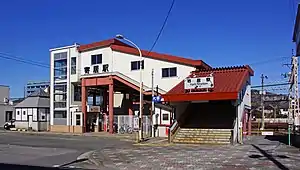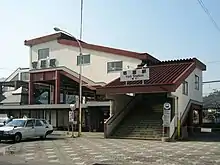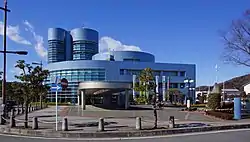Yorii Station
Yorii Station (寄居駅, Yorii-eki) is a railway station in Yorii, Saitama, Japan, jointly operated by East Japan Railway Company (JR East) and the private railway operators Tobu Railway and Chichibu Railway.[1][2]
TJ39 Yorii Station 寄居駅 | ||||||||||||||||||||||||||||||||||||||||
|---|---|---|---|---|---|---|---|---|---|---|---|---|---|---|---|---|---|---|---|---|---|---|---|---|---|---|---|---|---|---|---|---|---|---|---|---|---|---|---|---|
 The south entrance in February 2017 | ||||||||||||||||||||||||||||||||||||||||
| Location | Yorii, Yorii-machi, Ōsato-gun, Saitama-ken Japan | |||||||||||||||||||||||||||||||||||||||
| Coordinates | 36.117770°N 139.194632°E | |||||||||||||||||||||||||||||||||||||||
| Operated by | ||||||||||||||||||||||||||||||||||||||||
| Line(s) |
| |||||||||||||||||||||||||||||||||||||||
| Platforms | 3 island platforms | |||||||||||||||||||||||||||||||||||||||
| Other information | ||||||||||||||||||||||||||||||||||||||||
| Station code | TJ-39 (Tobu) | |||||||||||||||||||||||||||||||||||||||
| History | ||||||||||||||||||||||||||||||||||||||||
| Opened | 7 October 1901 | |||||||||||||||||||||||||||||||||||||||
| Services | ||||||||||||||||||||||||||||||||||||||||
| ||||||||||||||||||||||||||||||||||||||||
| Location | ||||||||||||||||||||||||||||||||||||||||
 Yorii Station Location within Japan | ||||||||||||||||||||||||||||||||||||||||
Lines
Yorii Station is served by the following three lines.
- Hachiko Line (Komagawa - Takasaki)
- Tobu Tojo Line (from Ikebukuro in Tokyo)
- Chichibu Main Line (Mitsumineguchi - Hanyū)
On the Tobu Tojo Line during the daytime, the station is served by two "Local" (all-stations) trains per hour in each direction to and from Ogawamachi. There are no direct trains to or from Ikebukuro.[3]
Station layout
The station consists of three island platforms, each serving two tracks for the Tobu Tojo Line, Chichibu Main Line, and Hachikō Line.
Platforms
| 1/2 | ■ Tobu Tojo Line | for Ogawamachi |
| 3 | ■ Chichibu Main Line | for Nagatoro, Chichibu, and Mitsumineguchi |
| 4 | ■ Chichibu Main Line | for Kumagaya, Gyōdashi, and Hanyū |
| 5 | ■ Hachiko Line | for Ogawamachi,Ogose, and Komagawa |
| 6 | ■ Hachiko Line | for Takasaki |
 The north entrance in February 2017
The north entrance in February 2017 The IC card touch-in point at the shared entrance to the platforms in June 2013
The IC card touch-in point at the shared entrance to the platforms in June 2013 The additional IC card touch-in point at the entrance to the Tobu platforms in June 2013
The additional IC card touch-in point at the entrance to the Tobu platforms in June 2013 The view looking east from the station footbridge in February 2017
The view looking east from the station footbridge in February 2017 The view looking west from the Tobu platform in February 2017, with an 8000 series train stabled
The view looking west from the Tobu platform in February 2017, with an 8000 series train stabled View of the station looking west in January 2006, with the Tobu platforms on the left, Chichibu Railway platforms in the centre, and JR East platforms off-camera to the right
View of the station looking west in January 2006, with the Tobu platforms on the left, Chichibu Railway platforms in the centre, and JR East platforms off-camera to the right View of the JR Hachiko Line platforms with KiHa 110 DMUs crossing in April 2007
View of the JR Hachiko Line platforms with KiHa 110 DMUs crossing in April 2007
History

The station opened on October 7, 1901, as the terminus of the Jōbu Railway (present-day Chichibu Railway) from Kumagaya.[4][5] From April 2, 1903, the Jōbu Railway line was extended from Yorii to Hagure.[4]
The Tobu Railway station opened on July 10, 1925, with the completion of the Tōjō Line from Ogawamachi.[4][5]
The JR (former Japanese Government Railways) station opened on January 25, 1933, following the extension of the Hachikō Line from Kodama. The Hachikō Line was extended south to Ogawamachi on October 6, 1934.[6]
The JR East section became Suica-compatible from February 2002. The Tobu section became Pasmo-compatible from March 2007.
From 17 March 2012, station numbering was introduced on the Tobu Tojo Line, with Yorii Station becoming "TJ-38".[7]
Passenger statistics
In fiscal 2010, the Tobu station was used by an average of 4,347 passengers daily.[8] In fiscal 2012, the JR East station was used by an average of 399 passengers daily (boarding passengers only).[9] The passenger figures for the JR East station in previous years (boarding passengers only) are as shown below.
| Fiscal year | Daily average |
|---|---|
| 2000 | 460[10] |
| 2005 | 473[11] |
| 2010 | 423[12] |
| 2011 | 376[13] |
| 2012 | 399[9] |
Surrounding area

- Yorii Town Office
- Yorii Library
See also
References
- "Yorii Station Information" (in Japanese). Japan: East Japan Railway Company. Retrieved 27 December 2010.
- "Yorii Station Information" (in Japanese). Japan: Tobu Railway. Retrieved 27 December 2010.
- Tobu Tojo Line Timetable, published January 2015
- Wakuda, Yasuo (1993). 私鉄史ハンドブック [Private Railway Handbook] (in Japanese). Tokyo: Denkisha Kenkyūkai. ISBN 4-88548-065-5.
- Terada, Hirokazu (July 2002). データブック日本の私鉄 [Databook: Japan's Private Railways]. Japan: Neko Publishing. ISBN 4-87366-874-3.
- Ishino, Tetsu; et al., eds. (1998). 停車場変遷大事典 国鉄・JR編 [Station Transition Directory - JNR/JR] (in Japanese). I. Tokyo: JTB Corporation. p. 167. ISBN 4533029809.
- 「東武スカイツリーライン」誕生! あわせて駅ナンバリングを導入し、よりわかりやすくご案内します [Tobu Sky Tree Line created! Station numbering to be introduced at same time] (pdf). Tobu News (in Japanese). Tobu Railway. 9 February 2012. Retrieved 21 March 2012.
- 駅情報(乗降人員) [Station information (Passenger statistics)] (in Japanese). Japan: Tobu Railway. Archived from the original on January 1, 2012. Retrieved 14 December 2011.
- 各駅の乗車人員 (2012年度) [Station passenger figures (Fiscal 2012)] (in Japanese). Japan: East Japan Railway Company. Retrieved 21 July 2013.
- 各駅の乗車人員 (2000年度) [Station passenger figures (Fiscal 2000)] (in Japanese). Japan: East Japan Railway Company. Retrieved 21 July 2013.
- 各駅の乗車人員 (2005年度) [Station passenger figures (Fiscal 2005)] (in Japanese). Japan: East Japan Railway Company. Retrieved 21 July 2013.
- 各駅の乗車人員 (2010年度) [Station passenger figures (Fiscal 2010)] (in Japanese). Japan: East Japan Railway Company. Retrieved 21 July 2013.
- 各駅の乗車人員 (2011年度) [Station passenger figures (Fiscal 2010)] (in Japanese). Japan: East Japan Railway Company. Retrieved 21 July 2013.
External links
| Wikimedia Commons has media related to Yorii Station. |
- JR East station information (in Japanese)
- Tobu station information (in Japanese)